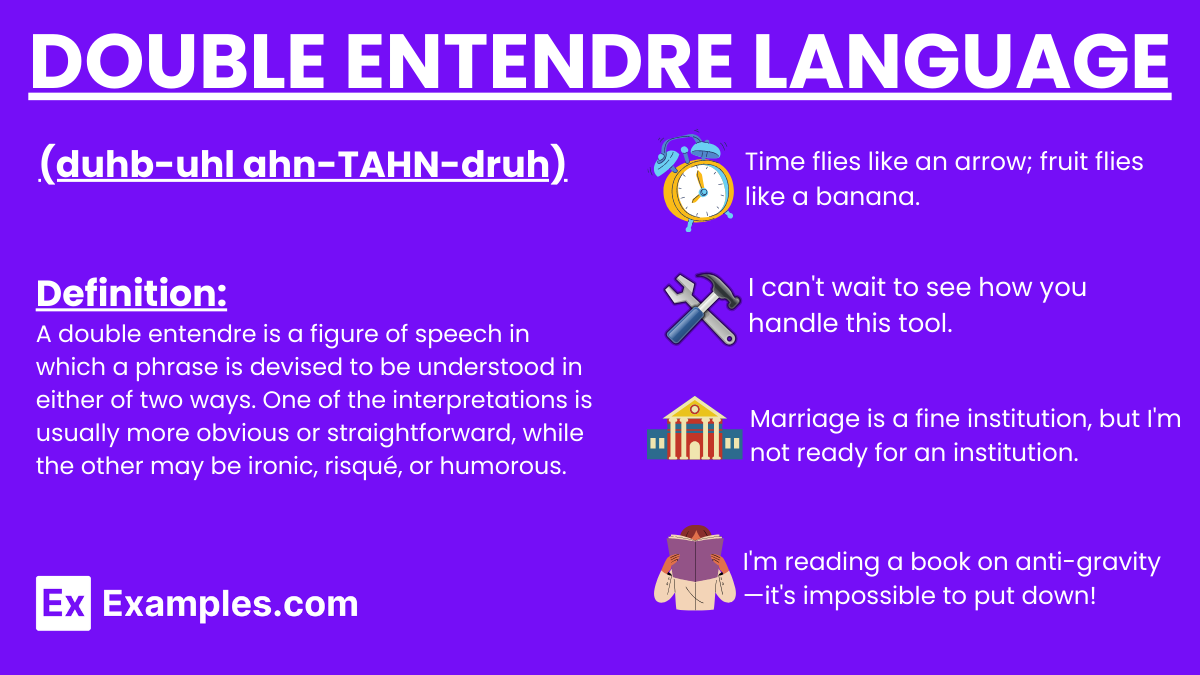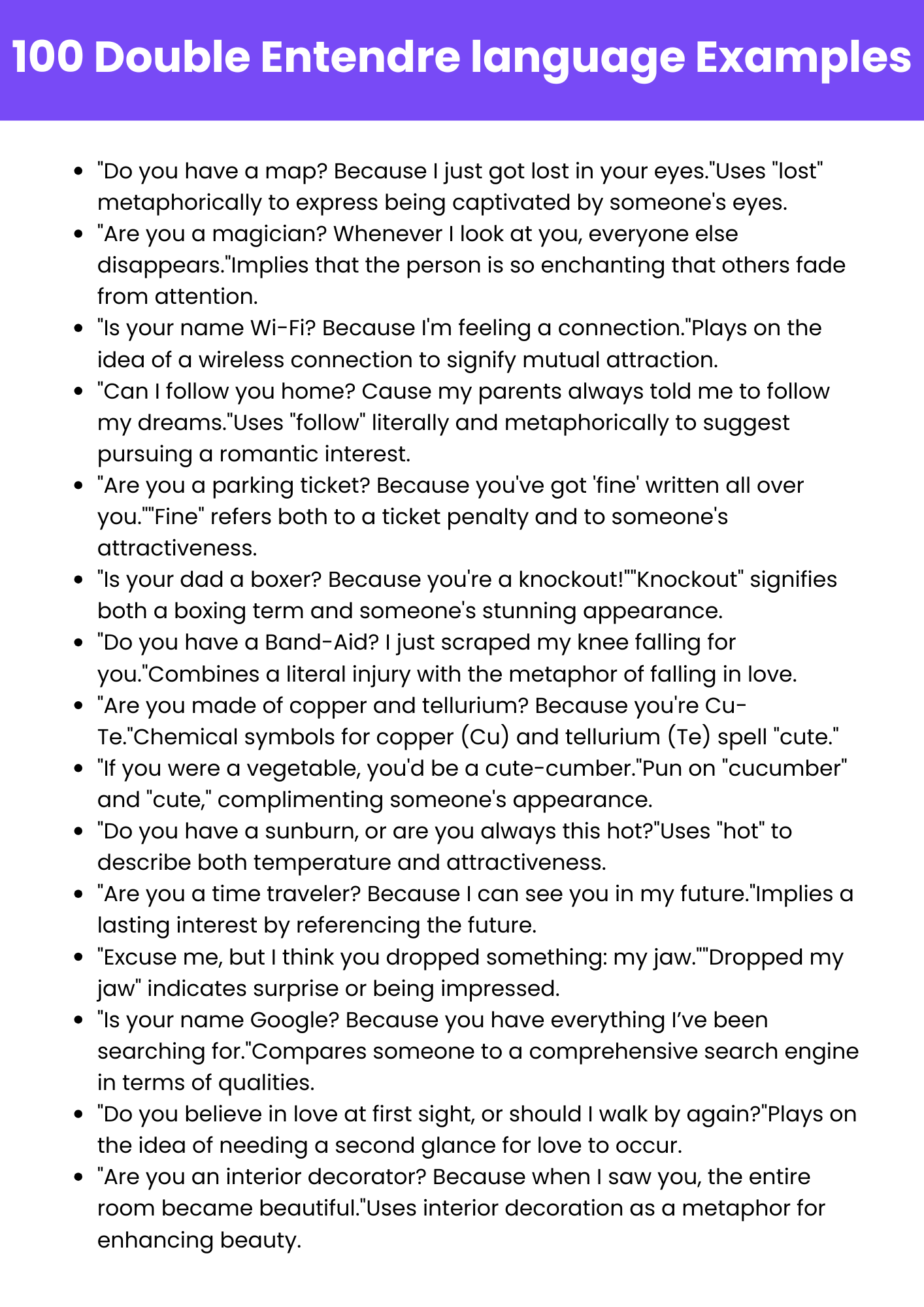Double Entendre
What is Double Entendre? – Definition
A double entendre is a figure of speech in which a phrase is devised to be understood in either of two ways. One of the interpretations is usually more obvious or straightforward, while the other may be ironic, risqué, or humorous.

Generated Double Entendre Examples

Download Double Entendre Examples
Enhance your understanding with our comprehensive PDF guide.
Download PDFExamples of Double Entendre
- Marriage is a fine institution, but who wants to live in an institution?
- I used to be a banker, but I lost interest.
- Time flies like an arrow; fruit flies like a banana.
- I’m reading a book on anti-gravity. It’s impossible to put down.
- I’d tell you a chemistry joke but I know I wouldn’t get a reaction.
- The carpenter couldn’t afford his tools so he got bored.
- I used to be a baker, but I couldn’t make enough dough.
- I wondered why the baseball was getting bigger. Then it hit me.
- I’m on a whiskey diet. I’ve lost three days already.
- The inventor of the door knocker got a no-bell prize.
- I used to work in a blanket factory, but it folded.
- I’m reading a book on anti-gravity. It’s impossible to put down.
- The man who survived pepper spray and mustard gas is now a seasoned veteran.
- I used to be a banker, but I lost interest.
- I used to be a banker, but I lost interest.
Types of Double Entendre
Clean Double Entendre
A double entendre that has a second meaning which is not offensive or inappropriate, often used for humor without any risqué implications.
- I used to be a baker, but I couldn’t make enough dough.
- Time flies like an arrow; fruit flies like a banana.
- The math teacher called me average. How mean!
- I’m reading a book on anti-gravity. It’s impossible to put down.
- The coffee file has been submitted.
Risqué Double Entendre
A double entendre that has a second meaning which is sexually suggestive or otherwise inappropriate, often used for humor in adult contexts.
- I told my wife she was drawing her eyebrows too high. She looked surprised.
- She had a photographic memory but never developed it.
- I’m on a seafood diet. I see food and I eat it.
- He has a stepladder because he couldn’t afford his own.
- I used to play piano by ear, but now I use my hands.
Wordplay Double Entendre
A double entendre that relies on puns, homophones, or similar sounding words to create dual meanings.
- I used to be a banker but I lost interest.
- The bicycle couldn’t stand on its own because it was two-tired.
- I wondered why the baseball was getting bigger. Then it hit me.
- I used to work in a blanket factory, but it folded.
- The man who survived pepper spray and mustard gas is now a seasoned veteran.
Contextual Double Entendre
A double entendre where the second meaning is heavily dependent on the context in which it is used.
- I’m reading a book on anti-gravity. It’s impossible to put down.
- He has a photographic memory but never developed it.
- The carpenter couldn’t afford his tools so he got bored.
- I used to be a baker, but I couldn’t make enough dough.
- I’m on a seafood diet. I see food and I eat it.
Subtle Double Entendre
A double entendre that is not immediately obvious, requiring the listener or reader to think deeper to understand the second meaning.
- The electrician couldn’t wire the house properly, so he lost his spark.
- I used to be a banker but I lost interest.
- The man who survived pepper spray and mustard gas is now a seasoned veteran.
- I wondered why the baseball was getting bigger. Then it hit me.
- I used to work in a blanket factory, but it folded.
Situational Double Entendre
A double entendre that arises naturally from the situation or context, often relying on the setting or circumstances.
- The photographer got arrested for taking pictures without a permit.
- The thief who stole calendars got twelve months.
- The mechanic couldn’t fix the car because he was out of oil.
- The baker couldn’t afford his own dough, so he kneaded the dough.
- The librarian was fired for checking out too many books.
How to Identify/Find Double Entendre?
To identify double entendre, look for phrases that have two meanings—one straightforward and one that is often more subtle, humorous, or risqué. Pay attention to the context and wordplay that might suggest an alternative interpretation.
- Look for phrases that can be interpreted in two different ways based on context.
- Identify wordplay, such as puns or homophones, that allow for dual meanings.
- Notice if the second meaning adds humor, irony, or a hidden message to the phrase.
- Consider the setting or situation which might influence the alternative interpretation.
- Analyze the intent behind the phrase—whether it’s meant to entertain, provoke thought, or convey a hidden meaning.
How to Use Double Entendre?
Use double entendre to add humor, irony, or depth to your writing and conversations. It can make your language more engaging and thought-provoking, but be mindful of your audience to ensure appropriateness.
- Incorporate wordplay that allows for dual interpretations without causing confusion.
- Use in dialogues or narratives to add layers of meaning or humor.
- Employ double entendre in advertising or marketing to create memorable and catchy slogans.
- Utilize in creative writing to enhance character dialogue or to add subtlety to themes.
- Balance the use of double entendre to maintain clarity and ensure it complements the overall message.
Other Literary Devices
Double Entendre in Literature
Literary works often employ double entendre to add depth, humor, or critique societal norms through subtle wordplay.
- I’m reading a book on anti-gravity. It’s impossible to put down.
- The novelist who wrote about cannibals was biting more than just his pen.
- She had a photographic memory but never developed it.
- The poet who loved gardening found his words blossoming.
- His stories were full of twists that left readers spinning.
Double Entendre Examples for Kids
Introduce children to the fascinating world of double entendre with age-appropriate and fun examples that are easy to understand.
- Why did the math book look sad? Because it had too many problems.
- Why don’t scientists trust atoms? Because they make up everything.
- Why was the broom late? It swept in.
- I used to play piano by ear, but now I use my hands.
- Why did the tomato turn red? Because it saw the salad dressing!
Double Entendre Examples for Students
Enhance students’ understanding of double entendre with examples that deepen their analytical skills and appreciation for wordplay.
- I wondered why the baseball was getting bigger. Then it hit me.
- The carpenter couldn’t afford his own tools so he got bored.
- The thief who stole calendars got twelve months.
- I’m on a whiskey diet. I’ve lost three days already.
- The electrician couldn’t wire the house properly, so he lost his spark.
Double Entendre Examples for Class 4
Age-appropriate and relatable examples of double entendre for Class 4 students to grasp easily.
- Why did the math book look sad? Because it had too many problems.
- Why don’t scientists trust atoms? Because they make up everything.
- Why was the broom late? It swept in.
- I used to play piano by ear, but now I use my hands.
- Why did the tomato turn red? Because it saw the salad dressing!
Explore Other Literary Devices
Elevate Your AP English Preparation
Unlock your potential with our comprehensive AP English exam preparation tools designed to help you excel.
- Extensive Question Bank: Access 900+ exam-like questions for both AP English Language and Literature.
- Expertly Crafted: Questions mirror the structure and difficulty of actual AP exams, ensuring relevant practice.
- Detailed Explanations: Understand your mistakes with clear, concise breakdowns of correct and incorrect answers.
- Personalized Learning: Tailor your study sessions with topic-specific tests and adaptive learning tools.
- Comprehensive Coverage: Master all aspects of the AP English curriculum with extensive guides and resources.
Frequently Asked Questions
-
What is a famous double entendre?
A famous double entendre is Shakespeare’s line from *Romeo and Juliet*: “Ask for me tomorrow, and you shall find me a grave man.” The word “grave” carries both the meanings of serious and a burial site. -
What is the meaning of entendre?
“Entendre” originates from French, meaning “to hear” or “to understand.” In English, it refers to interpreting words or phrases with a double meaning, often clever or risqué. -
What is an example of a double meaning?
An example of a double meaning is the phrase “She’s a real piece of work.” It could mean either someone impressive or someone difficult, depending on the tone and context. -
What is a double entendre in rap?
A double entendre in rap often involves clever wordplay. For example, in Jay-Z’s line, “I’m not a businessman, I’m a business, man,” the phrase carries both literal and figurative meanings about his success. -
What is a double meaning in slang?
In slang, double meanings are common. For instance, “lit” can mean “intoxicated” or “exciting.” Slang often relies on context to convey its intended double meanings.

